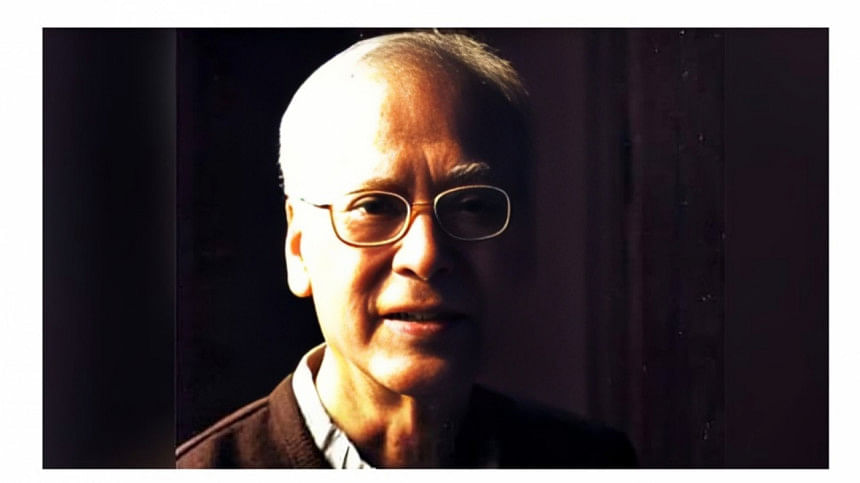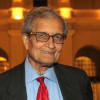An ode to Prof Anisur Rahman

Professor Anisur Rahman, a founding father of the "Two Economies" theory, which formed the intellectual foundation of Bangladesh's Liberation War, passed away on January 5, 2025 in Dhaka. An economist's economist, he was a scholar of immense influence across the social divide, and renowned for his lifelong commitment to the emancipation of the masses. Until his last days, he stood up for his cause and commitment to social democracy and people's participation in the development of this nation.
Born in 1933 in Brahmanbaria and laid to eternal rest in his ancestral home in Netrakona, Prof Rahman was the son of Hafizur Rahman, a former civil servant and cabinet minister in Pakistan. He received his early education in Kolkata and passed his matriculation from St Gregory's High School in 1949, where he was a classmate of Amartya Sen, another noted economist and Nobel laureate. He then attended Dhaka College and received his BA Honours and MA in economics from Dhaka University in 1955 and 1956, respectively. He then joined the Department of Economics of DU in 1957 as a faculty member, where he taught for three years before leaving for Harvard University, where he obtained his PhD in economics in 1962.
When he returned from Harvard, he began a very creative sojourn. He rejoined DU, serving as the chairman of the economics department in 1974-75. Simultaneously, his talent as an exponent of Rabindranath Tagore's artistic forms started to take shape and he bloomed as a musician and taught briefly at Chhayanaut.
"He excelled in every area he took an interest in, athletics, music or academic research," said Zafar Ahmed Caesar, formerly of the World Bank. Zafar, a former student of Prof Rahman, has researched the professor's life and career. He offered some memorable anecdotes about the professor. "His multifaceted talents blossomed at an early age, during his high school years."
My connection with Prof Rahman began as a first-year student in DU's economics department. At that time, we were in the thick of the Six-Point Movement, a political programme first outlined by the Awami League (AL) and embraced by people during the period leading up to the 1970 general election in Pakistan. As an aspirant economist, I became aware of Prof Rahman's seminal contribution to the "Two Economies" theory, the keystone of the Six-Point campaign, which led to AL's landslide victory in November 1970.
In the spring of 1970, the economics students of DU launched a newsletter named Optima, and I took a keen interest in the prevalent disparities between the two wings of Pakistan. I rummaged through all the issues of the Forum magazine and found a few articles by Prof Rahman, among others. The expositions on this platform piqued my interest in data-based economic analysis. I also explored his papers in the Pakistan Development Review, a peer-reviewed journal, and thus began my lifelong journey as an economist. As a fruit of this labour, I was able to summarise my findings on the economic disparities between then East and West Pakistan (now Bangladesh and Pakistan) and the ongoing transfer of resources from the East to the West since 1947.
Prof Rahman devoted his energy to research and training a cadre of economists, civil servants, and scholars both at Dhaka University and at the University of Islamabad in Pakistan, in 1967-70. Among his noted students during his tenure at Islamabad were Wahiduddin Mahmud and Anisul Islam Mahmud.
His contribution to our nation's journey to independence began in the early 1960s. Along with Prof Rehman Sobhan and Akhlaqur Rahman, he developed the "Two Economies" theory, which highlighted the significant economic disparities between then East and West Pakistan. They articulated this theory and analysed the imbalances between the two regions of Pakistan in professional journals as well as in other print media, particularly Forum. Other economists who shaped the theory were Dr A Sadeque, Nurul Islam, and Habibur Rahman.
I was fortunate to have him as my teacher during my final years as an MA student in 1974-75. After Bangladesh gained independence, Prof Rahman became a member of the first Planning Commission of the newborn nation. But, frustrated by the lack of political will of the government to take actionable steps to ameliorate the condition of workers and peasants, he soon left the Planning Commission and returned to teaching.
We were all excited to have him teach us the Economic Theory course and his chosen topic was capital theory. We had many talented teachers at DU, but his course was a capstone. In capital theory, he gave us an introduction to the Cambridge controversies, raging then between two camps on either side of the Atlantic. Paul Samuelson, a Nobel laureate in economics and a faculty member of the Massachusetts Institute of Technology (MIT), and Joan Robinson of the University of Cambridge in the UK, were leading the charge in a well drawn-out decade-long battle for the heart and soul of the theory of economic growth. The essays were long and very mathematical. We were totally unprepared for the complicated theorems and proofs that were part of the professional journal.
Fortunately for us, Prof Rahman, true to his commitment to his Marxist theory and his dedication to his students, considered that we should get a flavour of the field of theoretical economics and see how the profession handles disagreements and comes to a conclusion. He simplified the maths and brought every aspect of the ongoing battle to our level of understanding. He gave us a quick baptism by fire, and we felt empowered to see the frontlines of a debate between Samuelson, Solow, Robinson, and Sraffa, the titans of the field.
When Prof Rahman decided that he was going to assign the paper "Heterogeneous capital, the production function and the theory of distribution," written by a young Italian scholar named Piero Garegnani, I was not sure if he was being too bold. I came from the humanities background and was unprepared unlike most of my classmates—Ahsan (Mansur), Selim (Jahan) and Zafar (Ahmed), who came from a science background. But Anisur Rahman was a brilliant teacher and made it all so simple!
Years later, I registered for an advanced technical course titled Input-Output Analysis in my final years of coursework at Boston University. I felt such relief that my professor, Oldrich Kyn, assigned the article by Garegnani for the course and I winged it, thanks to Prof Anisur Rahman.
After he left Dhaka University in 1977, he joined the International Labour Office in Geneva, where he directed a programme on the participation of the rural poor in development until his retirement in 1990.
Prof Rahman was a strong advocate for self-development and participatory action research. He played an instrumental role in the introduction and promotion of participatory action research in Bangladesh through Research Initiatives, Bangladesh (RIB), a research-funding agency.
As we mourn this loss, we can hope that at this critical juncture of our nation, a leader resembling the vision of Prof Rahman will come forward and rise to the occasion to serve dukhi manush, as he called the downtrodden people of this country, and have the courage to tackle the problems and issues that needed to be addressed to make a safe passage for Bangladesh to emerge into a prosperous, democratic, and equitable society.
The author acknowledges the resources made available by Zafar Ahmed Caesar.
Dr Abdullah Shibli is an economist and works for Change Healthcare, Inc, an information technology company. He also serves as senior research fellow at the US-based International Sustainable Development Institute (ISDI).
Views expressed in this article are the author's own.
Follow The Daily Star Opinion on Facebook for the latest opinions, commentaries, and analyses by experts and professionals. To contribute your article or letter to The Daily Star Opinion, see our guidelines for submission.

 For all latest news, follow The Daily Star's Google News channel.
For all latest news, follow The Daily Star's Google News channel. 










Comments